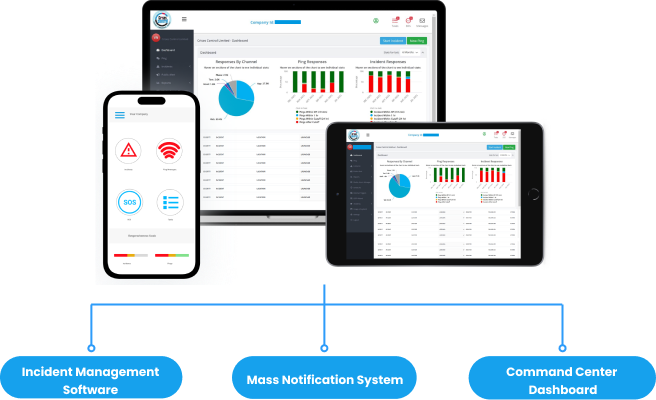In today’s hyper-connected world, a single misstep can snowball into a full-blown public relations nightmare. From disgruntled customers taking to social media to data breaches exposing sensitive information, crises can erupt unexpectedly, leaving organisations scrambling to contain the damage.
That’s where a crisis communication platform comes in – a powerful tool that empowers businesses to effectively plan, respond, and recover from critical situations.
But what happens if you neglect to implement such a platform?
Understanding the Importance of a Crisis Communication Platform
Picture this scenario: a data breach compromises sensitive customer information at your company. Panic ensues, stakeholders demand answers, and misinformation spreads like wildfire across social media channels. Without a comprehensive crisis communication plan in place, the repercussions can be devastating.
A crisis communication platform serves as a centralised hub for managing communication during emergencies. It streamlines the process of disseminating critical information, coordinating response efforts, and maintaining transparency with stakeholders. By leveraging technology and automation, businesses can navigate crises more effectively and minimise the impact on their reputation and bottom line.
Without a dedicated crisis communication platform, businesses are forced to navigate crises in a reactive, often chaotic manner. Here’s a glimpse into the potential consequences:
- Delayed Response: Precious time is wasted gathering information, formulating a cohesive message, and identifying the right communication channels. This delay allows negativity to fester online and erode public trust.
- Inconsistent Messaging: Disparate teams may inadvertently deliver conflicting messages, further confusing stakeholders and fueling speculation.
- Ineffective Communication Channels: Businesses may struggle to reach all their target audiences, leaving some key stakeholders uninformed or frustrated.
- Loss of Brand Reputation: A slow and disjointed response can severely damage your brand reputation, leading to customer churn, lost revenue, and even legal repercussions.
What Exactly is a Crisis Communication Platform?
At its core, a crisis communication platform is a digital solution designed to facilitate rapid and targeted communication during times of crisis. It enables organisations to reach employees, customers, media outlets, and other stakeholders through multiple channels, including email, SMS, voice calls, and mobile notifications.
One of the key features of a crisis communication platform is its ability to create predefined message templates tailored to different scenarios. This ensures consistency and accuracy in communication, even under duress. Additionally, these platforms often include real-time monitoring and reporting capabilities, allowing organisations to track the effectiveness of their response efforts and make data-driven decisions.
A crisis communication platform offers a centralised hub for managing all aspects of a crisis. It empowers organisations to:
- Develop a Crisis Communication Plan: The platform facilitates the creation and storage of comprehensive crisis communication plans, outlining specific actions for different scenarios.
- Centralise Communication Channels: Consolidate all communication channels (email, SMS, social media) within the platform, enabling rapid and consistent messaging across diverse audiences.
- Real-Time Collaboration: Facilitate seamless communication and collaboration between internal teams, ensuring everyone is on the same page and acting swiftly.
- Monitor Social Media: Track online conversations and identify potential issues before they escalate into major crises.
- Disseminate Accurate Information: Rapidly disseminate clear, concise, and accurate information to stakeholders, mitigating confusion and panic.
- Track and Measure Response: The platform allows you to track the effectiveness of your response efforts and identify areas for improvement.
The Benefits of Implementing a Crisis Communication Platform
The benefits of adopting a crisis communication platform are multifaceted and far-reaching. Here are some of the key advantages:
- Speed and Efficiency: During a crisis, every second counts. A communication platform enables organisations to reach stakeholders quickly and efficiently, minimising confusion and facilitating swift decision-making.
- Enhanced Coordination: Effective crisis management requires seamless coordination across teams and departments. With a centralised platform, stakeholders can collaborate in real-time, share updates, and allocate resources more effectively.
- Maintaining Trust and Credibility: In times of crisis, transparency is paramount. By providing timely and accurate information, organisations can preserve trust and credibility with their stakeholders, mitigating reputational damage.
- Compliance and Legal Protection: Regulatory requirements and legal obligations surrounding crisis management are increasingly stringent. A communication platform helps organisations ensure compliance with relevant laws and regulations, reducing the risk of legal repercussions.
- Post-Crisis Analysis and Learning: After the dust settles, it’s essential to conduct a thorough post-mortem analysis to identify areas for improvement. Many crisis communication platforms offer analytics and reporting tools that enable organisations to assess their response efforts, identify bottlenecks, and implement corrective measures.
How Crises Control Can Help

Crises Control is a leading provider of crisis communication platforms, offering a robust suite of features specifically designed to empower businesses to navigate any crisis effectively.
Here’s how Crises Control can be your crisis management saviour:
- Incident Management Software: Crises Control offers comprehensive incident management software that allows you to launch incident responses, activate pre-defined plans, and track task completion, all in real-time.
- Mass Notification System: Instantly deliver critical information to stakeholders via SMS, email, push notifications, and social media, keeping everyone informed and engaged.
- Geolocation Tracking: During a crisis, you can track the location of key personnel and ensure their safety, especially if they are travelling to high-risk areas.
- Command Center Dashboard: Gain a 360-degree view of the unfolding crisis with a centralised command centre dashboard that provides real-time updates on response efforts.
- Task Management: Assign tasks, track progress, and hold teams accountable with a robust task management system built into the platform.
Customer Testimonials
Here at Crises Control, we understand the importance of building trust with our customers. That’s why we’re proud of the positive feedback we receive:
“The ease of use has made it simple and effective to roll out our organisation.” – Chief Technology Officer
“We use Crises Control on a daily basis to communicate to up to 1000 candidates about new immediate roles available in the market and also updates to existing roles. We can rely on Crises Control to get mass messages out with certainty. We do this from our mobile phones and it is so easy!” – Managing Director
“Although this product is primarily designed for BC related comms, it actually has multiple uses. I have found that it is extremely useful for business communications in general and also distributing relevant information as mass communication and also team specific. The product is very personalisable. What stands out for me is that the product is always evolving based on feedback.” – Senior Product Manager
Don’t Wait Until Disaster Strikes
A crisis communication platform is not an expense; it’s an investment in your organisation’s resilience and brand reputation. Crises Control equips you with the tools and resources necessary to weather any storm and emerge stronger.
Don’t wait until disaster strikes. Contact us today to schedule a free demo and discover how Crises Control can empower your organisation to navigate crises with resilience and confidence. Your business’s future depends on it.
Request a Free Demo
Interested in our Crisis Communication Platform?
FAQs
1. What is a crisis communication platform, and why does my business need one?
A crisis communication platform is a digital solution designed to facilitate rapid and targeted communication during times of crisis. It serves as a centralised hub for managing communication, coordinating response efforts, and maintaining transparency with stakeholders. Businesses need a crisis communication platform to streamline their crisis management processes, ensure timely and accurate communication, and mitigate the impact of crises on their reputation and bottom line.
2. What are the key features of a crisis communication platform?
Crisis communication platforms typically include features such as:
– Predefined message templates tailored to different crisis scenarios
– Multiple communication channels (email, SMS, voice calls, social media) for reaching stakeholders
– Real-time monitoring and reporting capabilities
– Incident management software for launching response efforts and tracking task completion
– Geolocation tracking to ensure the safety of key personnel during crises
3. How does a crisis communication platform help businesses during a crisis?
– Speed and efficiency: Enables rapid communication with stakeholders, minimising confusion and facilitating swift decision-making.
– Enhanced coordination: Facilitates seamless collaboration across teams and departments, ensuring everyone is on the same page and acting swiftly.
– Maintaining trust and credibility: Provides timely and accurate information to stakeholders, preserving trust and credibility with customers, employees, and the public.
– Compliance and legal protection: Helps businesses ensure compliance with regulatory requirements and reduce the risk of legal repercussions.
– Post-crisis analysis and learning: Allows businesses to assess response efforts, identify areas for improvement, and implement corrective measures for future crises.
4. What are the benefits of implementing a crisis communication platform?
The benefits of implementing a crisis communication platform include:
– Speed and efficiency in crisis response
– Enhanced coordination and collaboration
– Preservation of trust and credibility with stakeholders
– Compliance with regulatory requirements and legal protection
– Opportunities for post-crisis analysis and learning to improve future response efforts
5. How can Crises Control help my organisation navigate crises effectively?
Crises Control offers a comprehensive suite of features designed to empower businesses to navigate any crisis effectively, including:
– Incident management software for launching response efforts and tracking task completion in real-time
– A mass notification system for instantly delivering critical information to stakeholders via multiple channels
– Geolocation tracking to ensure the safety of key personnel during crises
– A command center dashboard for gaining a 360-degree view of response efforts
– Task management capabilities for assigning tasks, tracking progress, and holding teams accountable
